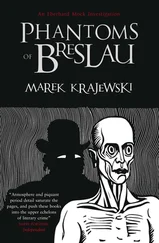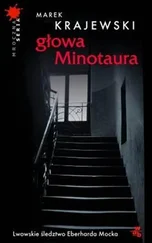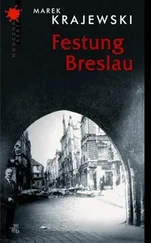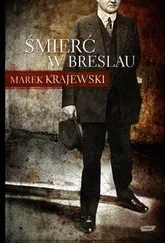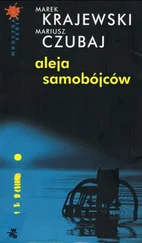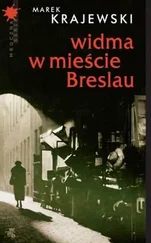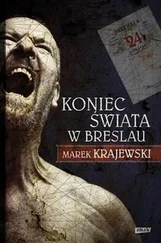Marek Krajewski - Death in Breslau
Здесь есть возможность читать онлайн «Marek Krajewski - Death in Breslau» весь текст электронной книги совершенно бесплатно (целиком полную версию без сокращений). В некоторых случаях можно слушать аудио, скачать через торрент в формате fb2 и присутствует краткое содержание. Жанр: Полицейский детектив, на английском языке. Описание произведения, (предисловие) а так же отзывы посетителей доступны на портале библиотеки ЛибКат.
- Название:Death in Breslau
- Автор:
- Жанр:
- Год:неизвестен
- ISBN:нет данных
- Рейтинг книги:3 / 5. Голосов: 1
-
Избранное:Добавить в избранное
- Отзывы:
-
Ваша оценка:
- 60
- 1
- 2
- 3
- 4
- 5
Death in Breslau: краткое содержание, описание и аннотация
Предлагаем к чтению аннотацию, описание, краткое содержание или предисловие (зависит от того, что написал сам автор книги «Death in Breslau»). Если вы не нашли необходимую информацию о книге — напишите в комментариях, мы постараемся отыскать её.
Death in Breslau — читать онлайн бесплатно полную книгу (весь текст) целиком
Ниже представлен текст книги, разбитый по страницам. Система сохранения места последней прочитанной страницы, позволяет с удобством читать онлайн бесплатно книгу «Death in Breslau», без необходимости каждый раз заново искать на чём Вы остановились. Поставьте закладку, и сможете в любой момент перейти на страницу, на которой закончили чтение.
Интервал:
Закладка:
“One move, one raised voice, and you’re dead,” Anwaldt tried to keep calm. Mock, in the meantime, went through the books on the desk. Then he turned and looked derisively at the defenceless man:
“Tell me, Maass, can you still get it up? You still like schoolgirls, I see …”
“I don’t know what you’re talking about.” Maass rubbed his burning ear. “You’ve taken me for somebody else. I’m George Mason, Professor of Semitic Languages at Columbia University.”
“We’ve changed, eh, Maass? I, Mock, was scalped by flaming tar paper falling from a roof and Herbert Anwaldt has grown fat on dumplings, his favourite meal in the lunatic asylum.” He turned the pages on the table. “You, on the other hand, your jowls have sunk and the rest of your once so beautiful locks have fallen out. But the temperament remains the same, eh, Maass?”
The questioned man stayed silent, but his eyes grew larger. He opened his mouth in horror, but did not manage to cry out. Mock firmly pressed his arms into the armrests and Anwaldt, quick as lightning, pushed the handkerchief almost down his throat. After a few minutes, Maass’ terrified eyes had dimmed. Anwaldt removed the gag and asked:
“Why did you betray me to the Turk, Maass? When did they buy you? Why weren’t you loyal to Baron von der Malten? His gratitude and money would have freed you of the trouble of seeking private tuition for the rest of your life. But you’ve always liked private tuition … Particularly with debauched schoolgirls …”
Maass reached for the bottle of Jack Daniel’s on the table beside him and took a long swig straight from the bottle. Tiny drops appeared on the bald head.
“What in your view, Anwaldt, is the most important thing in the world?” he had stopped hiding behind his fictitious name. Without waiting for a reply, he continued: “The most important thing is truth. But what’s truth to you when you curse your burning masculinity at night, when the swaying of a passing female’s hips destroys ingenious pyramids of conclusions which give rise to each other, and unaffected levels of syllogisms. You can only experience peace when the most renowned scholarly periodicals long for your articles and the exquisite nymphs for your phallus to subjugate them every night … Have you ever experienced that, Anwaldt? Because that’s what I experienced sixteen years ago in Breslau when Kemal Erkin sent undiscovered manuscripts for me to look at and compliant houris at my feet in return for one simple expert opinion. I know the girls did not love or desire me. So what? It was enough that they fulfilled all my whims every day. They assured me peace in my work. Thanks to them I could free myself of the furious and capricious lord hiding within my loins. Not having to think about him, I got on with my work. I published a manuscript which was considered lost and the discovery brought me world fame. When endowed by Erkin with an enormous sum of money and a photocopy of the manuscript — the one supposedly lost — I fled Breslau. I knew that every department of Oriental Studies would be open to me.” He took another swig of whisky and grimaced. “I chose New York, but you found me even here. Just tell me: why? Primal revenge? You’re Europeans, after all, Christians … What about your commandment to forgive?”
“You’re mistaken, Maass. But Anwaldt and I have a great deal in common with the Yesidis or — to be more precise — after what we’ve been through, we believe in the power of fate.” Mock opened the window and gazed at the huge neon sign advertising Camel cigarettes. “And you, Maass, do you believe in destiny?”
“No …” Maass laughed, revealing snow-white teeth. “I believe in coincidence. It’s a coincidence that my pupil introduced me to Erkin, a coincidence that I discovered your real parentage, Anwaldt …”
“Again you’re mistaken, Maass,” Mock settled himself comfortably in the armchair and spread out his elegant file. “I’ll prove the existence of fate to you in a moment. Do you remember Friedlander’s last two prophecies? In your translation, the first of them went: arar ‘ruin’, chavura ‘wound’, makak ‘fester’, afar ‘rubble’, shamayim ‘heaven/sky’. That prophecy referred to me. Makak is nothing other than my name — Mock. The prophecy proved true. Captain Eberhard Mock of the Abwehr died and an officer of the Secret Communist Police, Stasi, Major Eberhard Mock, was born. Different face, different person, same name. Destiny … And now look at that second prophecy, Maass. It goes: yeladim ‘children’, akrabbim ‘scorpions’, amotz ‘white’, and chol ‘sand’ or chul ‘to wriggle, to fall’. I thought that this prophecy referred to Anwaldt ( yeladim sounds like Anwaldt). And it almost proved true. A major from the Stasi, a hefty Uzbek with pockets full of scorpions, arrived at the psychiatric hospital so as to accomplish the secret mission. Anwaldt was to die within white walls ( amoc — white), in a room where windows were fitted with bars ( sevacha — a grille), with his belly full of scorpions wriggling ( chul — to wriggle). But I interpreted that prophecy differently and altered destiny. Anwaldt became a language specialist who — in hospital — taught himself to be a pretty good expert in Semitic languages. And the Uzbek and his brothers from the desert stayed in the Dresden hospital …”
Mock strolled up and down the room, proudly thrusting his hefty chest forward.
“So you see, Maass? I am destiny. Yours too … Do you want to know my interpretation of that last prophecy? Here it is: amoc is ‘Maass’, then — jeladim ‘children’, akrabbim ‘scorpions’, chul ‘to fall’. ‘Children’, ‘scorpions’, and ‘to fall’ are omens of your death.”
Mock stood in the middle of the room and raised his arms above his head. He froze in this position of a pagan priest and in a grave voice proclaimed:
“I, Eberhard Mock, relentless fate, I, Eberhard Mock, impending death, ask you, son, do you prefer to fall to the street from this floor or die from the venom of little scorpions, children still, scorpion children but with murderous poison already in their tails?”
Mock clearly emphasized the words “scorpion children” and “to fall out”. Maass could not understand what scorpions he was talking about until Anwaldt opened a small medical box. Maass peered inside and paled. Little, black arachnids were rotating their pincers and flexing their abdomens as they tried to clamber out of the box. The German language long unheard by him repeated itself in his ears. The verb ausfallen — “to fall out” — hissed and vibrated. He made towards the open window.
In the darkness of the night, the neon smoker on the sign opposite blew a series of smoke rings.
Интервал:
Закладка:
Похожие книги на «Death in Breslau»
Представляем Вашему вниманию похожие книги на «Death in Breslau» списком для выбора. Мы отобрали схожую по названию и смыслу литературу в надежде предоставить читателям больше вариантов отыскать новые, интересные, ещё непрочитанные произведения.
Обсуждение, отзывы о книге «Death in Breslau» и просто собственные мнения читателей. Оставьте ваши комментарии, напишите, что Вы думаете о произведении, его смысле или главных героях. Укажите что конкретно понравилось, а что нет, и почему Вы так считаете.

